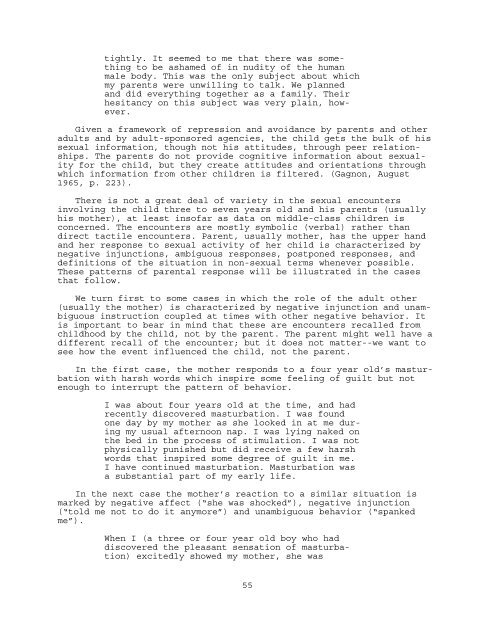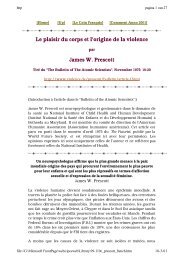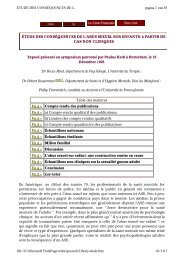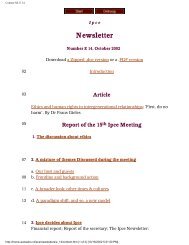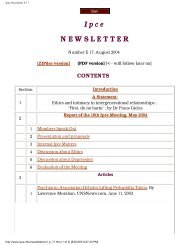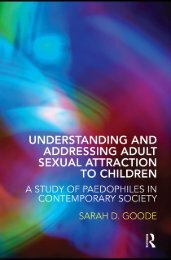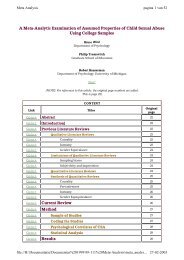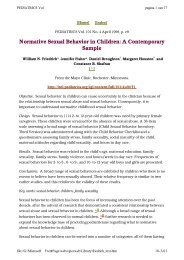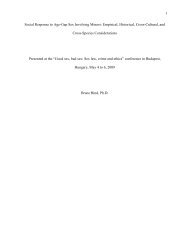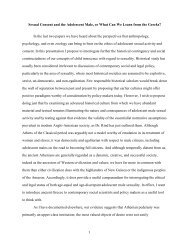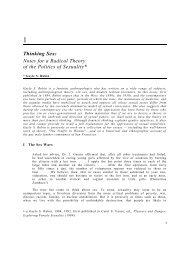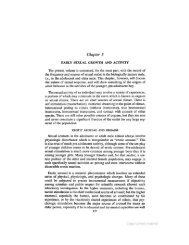Infant and Child Sexuality: A Sociological Perspective - Ipce
Infant and Child Sexuality: A Sociological Perspective - Ipce
Infant and Child Sexuality: A Sociological Perspective - Ipce
You also want an ePaper? Increase the reach of your titles
YUMPU automatically turns print PDFs into web optimized ePapers that Google loves.
tightly. It seemed to me that there was something<br />
to be ashamed of in nudity of the human<br />
male body. This was the only subject about which<br />
my parents were unwilling to talk. We planned<br />
<strong>and</strong> did everything together as a family. Their<br />
hesitancy on this subject was very plain, however.<br />
Given a framework of repression <strong>and</strong> avoidance by parents <strong>and</strong> other<br />
adults <strong>and</strong> by adult-sponsored agencies, the child gets the bulk of his<br />
sexual information, though not his attitudes, through peer relationships.<br />
The parents do not provide cognitive information about sexuality<br />
for the child, but they create attitudes <strong>and</strong> orientations through<br />
which information from other children is filtered. (Gagnon, August<br />
1965, p. 223).<br />
There is not a great deal of variety in the sexual encounters<br />
involving the child three to seven years old <strong>and</strong> his parents (usually<br />
his mother), at least insofar as data on middle-class children is<br />
concerned. The encounters are mostly symbolic (verbal) rather than<br />
direct tactile encounters. Parent, usually mother, has the upper h<strong>and</strong><br />
<strong>and</strong> her response to sexual activity of her child is characterized by<br />
negative injunctions, ambiguous responses, postponed responses, <strong>and</strong><br />
definitions of the situation in non-sexual terms whenever possible.<br />
These patterns of parental response will be illustrated in the cases<br />
that follow.<br />
We turn first to some cases in which the role of the adult other<br />
(usually the mother) is characterized by negative injunction <strong>and</strong> unambiguous<br />
instruction coupled at times with other negative behavior. It<br />
is important to bear in mind that these are encounters recalled from<br />
childhood by the child, not by the parent. The parent might well have a<br />
different recall of the encounter; but it does not matter--we want to<br />
see how the event influenced the child, not the parent.<br />
In the first case, the mother responds to a four year old’s masturbation<br />
with harsh words which inspire some feeling of guilt but not<br />
enough to interrupt the pattern of behavior.<br />
I was about four years old at the time, <strong>and</strong> had<br />
recently discovered masturbation. I was found<br />
one day by my mother as she looked in at me during<br />
my usual afternoon nap. I was lying naked on<br />
the bed in the process of stimulation. I was not<br />
physically punished but did receive a few harsh<br />
words that inspired some degree of guilt in me.<br />
I have continued masturbation. Masturbation was<br />
a substantial part of my early life.<br />
In the next case the mother’s reaction to a similar situation is<br />
marked by negative affect (“she was shocked”), negative injunction<br />
(“told me not to do it anymore”) <strong>and</strong> unambiguous behavior (“spanked<br />
me”).<br />
When I (a three or four year old boy who had<br />
discovered the pleasant sensation of masturbation)<br />
excitedly showed my mother, she was<br />
55


